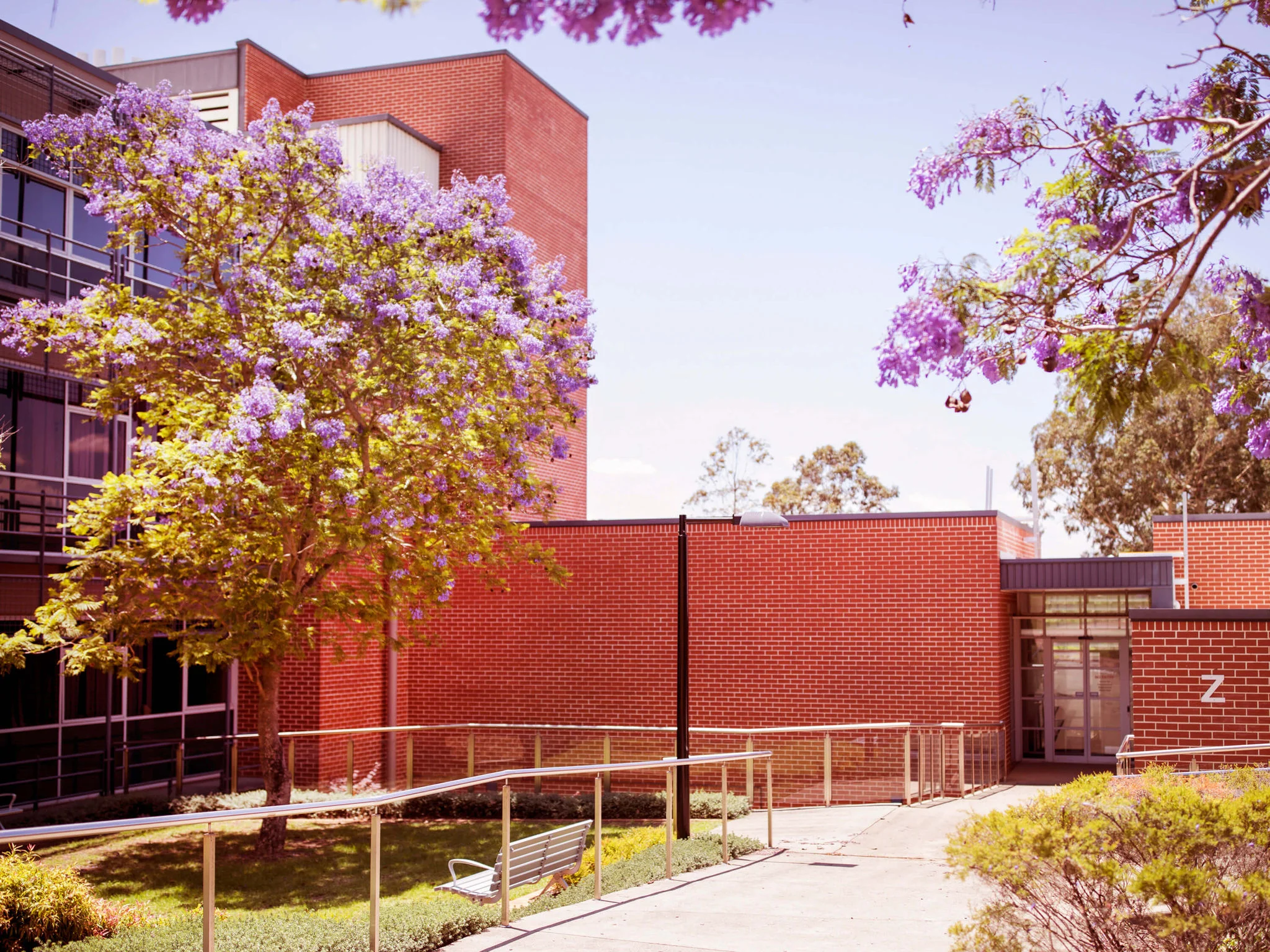This program is designed for high achieving law students in the Bachelor of Science/ Bachelor of Laws program who wish to undertake an extended level of study and research in Law.
Science and Laws at Western
Accreditation
Graduates from the Bachelor of Laws are eligible to apply to the Legal Profession Admission Board for admission to legal practice in NSW after undertaking prescribed practical legal training.
The Bachelor of Science (Chemistry) is accredited by the Royal Australian Chemical Institute (RACI) for normal entry of a graduate to the Chartered Chemist degree.
What you can expect to study
The program structure is outlined in our handbook. Here you can view all of the subjects you will be studying.
Students are required to complete eight major subjects from one of the following testamur majors. Students selecting Environmental Health are required to complete twelve major subjects.
Students may use their elective subjects to complete a major (80 credit points) or one or more minors (40 credit points each) from the same or another discipline area, or up to 80 credit points from the wide range of units offered by Western Sydney University.
Students may choose to complete a second major such as the double major in innovative foods and human nutrition. A minor in education is also available.
Students must maintain a grade point average of 5 or above to remain in the program. Those who do not maintain this average will be transferred to the Bachelor of Science.
You can choose from the following majors:
Immersed in an approach that integrates social, economic and environmental values, students will view plant and animal production from consumer contexts to explore personal and community perceptions about food sustainability. This innovative course merges topics of agriculture, food and health to empower you to design solutions for international development, community education and the urban–rural interface. This major provides hands-on experience, developing confidence and giving graduates an excellent foundation for careers in: teaching, research, biotechnology and industry. Throughout study, engagement with industry and community will inspire you to take action towards a regenerative and more environmentally sustainable Agricultural future.
The flexibility of the course also enables students to combine their interest in Agricultural Science with other disciplines including animal science, data science, ecology, food science and innovation, health and business.
Interactions between people and animals are increasing due to our reliance on animals for companionship and food production. This major will enable you to develop a deep understanding of these issues, through studies of animal behaviour, animal health and welfare, animal nutrition, animal production, animal reproduction, and human-animal interactions. You will have access to diverse on-campus animal facilities including reptiles, native mammals, sheep, cattle and deer and off-campus organisations such as wildlife parks, zoos and farms.
A variety of exciting career paths are available to graduates of this program, including international opportunities in the many fields of animal science. Graduates of this degree can look forward to career opportunities as an animal welfare officer, life scientist, quarantine officer, animal journalist or can progress into pursuing a research career, teaching career or working in government and related industries.
This major provides a deep knowledge of physics and its applications. While also developing a grounding in mathematics and strong computing knowledge, the physics major assures understanding of the concepts, tools and techniques of physics including the interfaces where physics contributes to other scientific disciplines, and the use of physics in wider intellectual and social contexts.
Graduates of this degree can look forward to career opportunities as a medical laboratory scientist, forensic scientist, in government and related industries, in scientific and technical management or can pursue a research or secondary teaching career.
This major provides students with a broad knowledge base of biology from the molecular world to global ecosystem science with a focus on the sustainability of the natural world. The major allows students to use the learning beside a range of other diverse majors and is especially applicable to students who are considering teaching as a career. Students will have the opportunity to develop discipline knowledge alongside scientific laboratory and inquiry based skills. The major also includes developing strong communication and critical thinking skills, essential for the future role of biology graduates.
Graduates of this degree can look forward to career opportunities as a laboratory scientist, research scientist, in government and related industries or can progress into pursuing a research career or a career in secondary teaching.
A Bachelor of Science with a chemistry major will prepare you to take part in a process of inquiry, by both contributing to it and by using scientific knowledge to solve current problems. The Chemistry program provides a strong background in the key topic areas of contemporary chemistry, including aspects of chemical theory in analytical, inorganic, organic and physical chemistry, with a strong emphasis on practical laboratory skills, and applications in contemporary research, industry and the environment. A research project is available to students in the final year of the degree preparing you for a professional career in a wide range of chemistry based industries. The degree allows for the completion of a second major or additional minors and electives to diversify learning for the careers of the future.
Graduates of this degree can look forward to career opportunities as a research scientist, forensic scientist, or a scientist in environment, mining or manufacturing industries. Other opportunities can be found in pharmaceutical industries, health and food industries, in scientific and technical sales, consumer affairs or you can progress into pursuing a research or secondary teaching career.
This major will provide students with a detailed understanding of the diversity of the animal kingdom. Students will develop a scientific understanding of how animals function and interact with their environment; from their ecology, behaviour and evolution; to the physiology and biochemistry of cells, tissues and major organ systems. On-campus animal facilities include those for reptiles, small marsupials and rodents, sheep and cattle, as well as over 1000ha of native, rural and aquatic habitats. This major will enable students to graduate with practical laboratory and fieldwork skills that will prepare you across a wide variety of disciplines in this field.
Graduates of this degree can look forward to career opportunities as a zoologist, in animal nutrition, in reproduction technology, genetics, behaviour and health, product development and physiology, scientific officer and science communicator. Other opportunities include pursuing postgraduate research study.
This major provides students specialised expertise in forensic science including methods of forensic analysis, crime scene investigation, forensic photography, forensic investigation, crime and criminal justice and complex cases. Career opportunities include forensic scientists, crime scene investigators, private investigators and consultants, police officers, drug analysts, researchers and academics, and specialised forensic science practitioners. The main employers of forensic scientists are State and Federal police services, State and Commonwealth Government Health Departments and analytical chemistry laboratories. Graduates will be versatile with a wide skills base with (depending on their choice of electives) potential for employment in analytical chemistry and microbiology, quality control and assurance, biochemistry and molecular biology, scientific research, education and the chemical industry.
The air we breathe, the water we drink, the food we eat, and the places we live, work and play all have major impacts on our health and well-being. The testamur major Environmental Health, when combined with the major Environmental Futures in a Bachelor of Science, will equip you to explore the diverse range of natural and built-environment challenges that confront us, from the mitigation of human health impacts of global climate change through to the more localised issues of air and water quality, waste management, food security, environmental noise and healthy communities. The major areas of study addressed within the major include air pollution; community studies; emergency management; environmental regulation and policy; environmental monitoring; environmental planning; environmental protection; epidemiology; food safety; noise, occupational environment; risk assessment; sustainable environmental management; toxicology; urban development and water pollution.
https://acedd.org.au/
This major will help you understand nutrition, and the science behind food in the largest business sector in the world.
A major in Food Science and Innovation will prepare you to be a leader in developing innovative, safe, healthy and sustainable foods. A solid foundation in the biological and chemical sciences, needed to underpin food science, will enable graduates from this program to be confident in the rapidly evolving food technology sector. Graduates can pursue opportunities in food formulation, food research and development, quality assurance, food plant management, food molecular biology, flavour chemistry, consumer relations, food quality assurance and teaching. The program is flexible and enables you to undertake units in human nutrition and health, food production, biotechnology, integrated management with industry and community links, with modern sensory and food processing facilities.
Graduates can pursue opportunities in food formulation, food research and development, quality assurance, food plant management, food molecular biology, flavour chemistry, consumer relations, food quality assurance and teaching.
Managing our environment sustainably requires professionals who are trained in new technologies across multiple disciplines, including biological and physical sciences, risk assessment, policy and management. Understanding how life interacts with water, soil and the atmosphere empowers us to develop sustainable management solutions for our most pressing environmental challenges. You will learn how to apply fundamental scientific knowledge to evaluate and mitigate the impacts of human activities on natural and managed ecosystems, including the built environment. You will have access to world class ecological and environmental research facilities, and will engage in hands-on, field-based learning, taught by a team at the cutting edge of research in this field.
As a graduate, you are prepared for a career in environmental management, consultancy and biological conservation.
Career Opportunities
As a graduate of this degree, you can look forward to a broad range of exciting career opportunities in different sectors and industries. Below are some examples of the possible careers you can pursue with this degree:
- Scientific patents
- Copyright and trademark infringements
- Scientific research
- Forensic work
Entry requirements for domestic students
Admission
This program is designed for students in the Bachelor of Science/Bachelor of Laws program who wish to undertake an Honours program.
Students must meet all of the following criteria for admission:
- Completion of at least 160 credit points of law study (or 140 credit points if two Summer subjects are undertaken);
- Demonstration of the likelihood of graduating with an Honours Weighted Average Mark (HWAM) of at least 70 at the time of graduation; or an Admission Average Mark (AAM) of at least 70 at the time of admission to the Honours program. Refer to https://www.westernsydney.edu.au/schools/sol/honours for details;
- Demonstration of satisfactory academic writing skills;
- Availability of a principal supervisor.
Special Requirements Prerequisites
Students enrolling in these subjects may need to have a National Police Certificate and consent or prohibited employment declarations as they may be conducting their placement in circumstances where they work with minors. This would be managed on an as needs basis:
- LAWS 4017 Access to Justice Clinic
- LAWS 3074 Judicial Internship
- LAWS 3077 Legal Internship
- LAWS 4012 First Nations Peoples' Access to Justice Clinic
- LAWS 3080 Street Law Clinic
- JUST 3011 Issues in the Criminal Justice System (corrective services field trip requirement) - Also records and identity check.
The following subjects require a visa for the relevant country and the ability to travel at specified time:
- LAWS 3024 Foundations of Chinese Law
- LAWS 3025 Law, Culture and Entrepreneurial Innovation in India
- LAWS 3078 Legal, Economic and Social Transformation in Taiwan
Please consult the handbook for more information.
Entry requirements for international students
**The Part-time option is not available to International Students on a Student Visa.
Admission
This program is designed for students in the Bachelor of Science/Bachelor of Laws program who wish to undertake an Honours program.
Students must meet all of the following criteria for admission:
- Completion of at least 160 credit points of law study (or 140 credit points if two Summer subjects are undertaken);
- Demonstration of the likelihood of graduating with an Honours Weighted Average Mark (HWAM) of at least 70 at the time of graduation; or an Admission Average Mark (AAM) of at least 70 at the time of admission to the Honours program. Refer to https://www.westernsydney.edu.au/schools/sol/honours for details;
- Demonstration of satisfactory academic writing skills;
- Availability of a principal supervisor.
Special Requirements Prerequisites
Students enrolling in these subjects may need to have a National Police Certificate and consent or prohibited employment declarations as they may be conducting their placement in circumstances where they work with minors. This would be managed on an as needs basis:
- LAWS 4017 Access to Justice Clinic
- LAWS 3074 Judicial Internship
- LAWS 3077 Legal Internship
- LAWS 4012 First Nations Peoples' Access to Justice Clinic
- LAWS 3080 Street Law Clinic
- JUST 3011 Issues in the Criminal Justice System (corrective services field trip requirement) - Also records and identity check.
The following subjects require a visa for the relevant country and the ability to travel at specified time:
- LAWS 3024 Foundations of Chinese Law
- LAWS 3025 Law, Culture and Entrepreneurial Innovation in India
- LAWS 3078 Legal, Economic and Social Transformation in Taiwan
Please consult the handbook for more information.
Indicative annual fee
A Commonwealth Supported Place (CSP) is one that is subsidised by the Commonwealth and applicable only to Domestic students. This means that the Australian Government pays part of your fees towards your program, therefore reducing your program fees, and the remaining amount is paid by you, this is considered your Student Contribution.
The fee estimates provided are indicative only and subject to change. These estimates are based on the current fee structures for a normal full time study load. However, the final fees may vary depending on several factors, including the specific subjects chosen, the duration and timing of study, and annual fee adjustments (subject to Commonwealth student contribution band rates). Please note that these estimates do not include the Student Services and Amenities Fee. We encourage all prospective and current students to consult with our Student Services Hub for the most current fee information.
As a multi-campus institution, Western Sydney University and its entities reserves the right to alter the location of its programs between campuses and other locations as necessary.
To work out how much your Student Contribution will be before you study, you will first need to find out the Student Contribution band your subjects fit into based on their general discipline area.
You can then calculate your student contributions to work out the total amount of your contribution.
The Higher Education Loan Program (HELP) is a range of loans introduced by the Australian Government from 2005 to provide fee payment assistance to eligible students. Loans are for Australian citizens studying in Australia or overseas. Permanent residents who hold a humanitarian visa are also eligible if studying in Australia.
If eligible you may be able to defer all or part of your Student Contribution through the HECS-HELP loan program. You may also be eligible for OS-HELP if undertaking studies overseas.
New Zealand citizens and holders of an Australian permanent resident visa (other than an Australian permanent humanitarian visa) are generally not entitled to HECS-HELP assistance. If you are a New Zealand citizen or permanent resident your Student Contribution amount must be paid in full by the census date.
However, the Australian Government has passed new legislation that changes the way some New Zealand citizens, who hold a Special Category Visa (SCV), studying in Australia will pay their fees. More information is available on the Changes to fees for New Zealand Citizens webpage.
The fee estimates provided are indicative only and subject to change. These estimates are based on the current fee structures for a normal full time study load. However, the final fees may vary depending on several factors, including the specific subjects chosen, the duration and timing of study, and annual fee adjustments (subject to Commonwealth student contribution band rates). Please note that these estimates do not include the Student Services and Amenities Fee. We encourage all prospective and current students to consult with our Student Services Hub for the most current fee information.
As a multi-campus institution, Western Sydney University and its entities reserves the right to alter the location of its programs between campuses and other locations as necessary.
Apply as an International Student
If you are an international student, you can apply for free through our international student application system or through an agent representative.
International students are:
- Not an Australian citizen;
- Not a New Zealand citizen; and
- Not a permanent resident of Australia.
If you are an international student completing the Australian HSC, IB or NCEA, apply direct via UAC International.
Admission to Western Sydney University is on the basis of meeting minimum academic and English language requirements. For more information about tuition fees and other costs, visit the Fees and Costs page.
Scholarships
When you apply to Western, you’re automatically assessed for a Scholarship, no additional application required! We’re offering multi-year scholarships (for up to 3 years) valued at $6,000 or $3,000 and even 50% off tuition fees. Scholarships are awarded on academic merit.
Want to know more?
We're here to provide clarity.
If you're uncertain about your study journey, enquire about our program today and gain the confidence to move forward.
Australian students
1300 668 370
International students
+61 2 9852 5499

The fee estimates provided are indicative only and subject to change. These estimates are based on the current fee structures for a normal full time study load. However, the final fees may vary depending on several factors, including the specific subjects chosen, the duration and timing of study, and annual fee adjustments (subject to Commonwealth student contribution band rates). Please note that these estimates do not include the Student Services and Amenities Fee. We encourage all prospective and current students to consult with our Student Services Hub for the most current fee information.
As a multi-campus institution, Western Sydney University and its entities reserves the right to alter the location of its programs between campuses and other locations as necessary.





